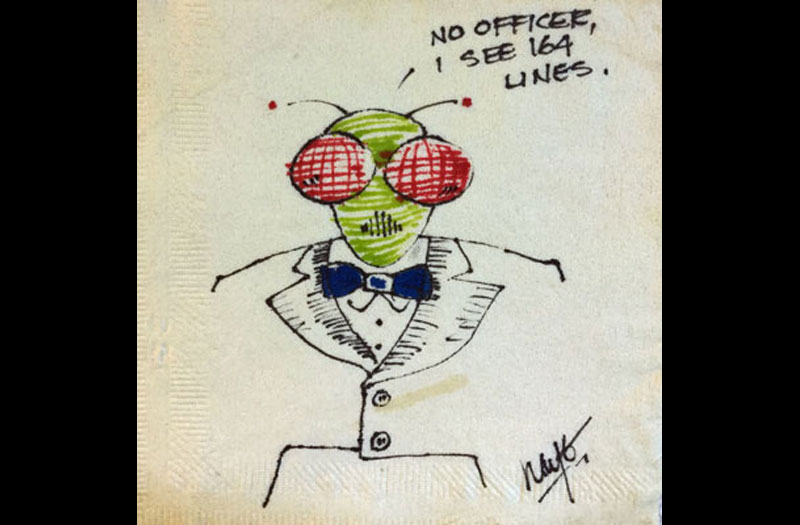[Click BLUE links for sources and information]
Absence of mind doesn’t mean you are careless or lacking in focus; it just means the mind is meandering through fascinating labyrinths invisible to the open eye. Vinita Dawra Nangia, Are You Often Absent-Minded
Writers are absent-minded, you know that, Wilf. William Golding, The Paper Men
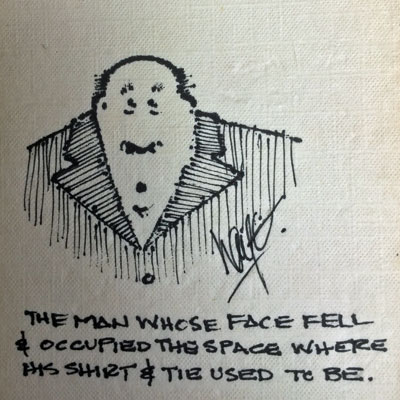
Sea Gull Cellar Bar Napkin Art, Jack Haye artist
Literature, philosophy, history, science—they are full of absent-minded characters. The ancient Greek philosopher Thales walked along gazing at the stars and fell into a pit. Adam Smith, author of The Wealth of Nations, walked out of his house one morning while thinking about his economic theories. Fifteen miles later church bells woke him from his deep thoughts. He found himself in his nightgown in another town. Archimedes, engrossed in drawing his mathematical circles in the sand, failed to notice when the Romans conquered Syracuse. A Roman soldier ran him through with a sword because he wouldn’t abandon his calculations. Isaac Newton, like many brilliant scientists, often forgot to eat. Sometimes when he went to fetch a bottle of wine for his friends, he’d forget why and where he was going and end up back in his room at work. G.K. Chesterton once kept trying to open his door with a corkscrew he had borrowed from neighbors rather than the latchkey in his other hand.
Take almost any path you please, and ten to one it carries you down in a dale, and leaves you there by a pool in the stream. There is magic in it. Let the most absent-minded of men be plunged in his deepest reveries–stand that man on his legs, set his feet a-going, and he will infallibly lead you to water, if water there be in all that region. Should you ever be athirst in the great American desert, try this experiment, if your caravan happen to be supplied with a metaphysical professor. Yes, as every one knows, meditation and water are wedded forever. Herman Melville, Moby Dick

Sea Gull Cellar Bar Napkin Art, Jack Haye artist
Absent-mindedness could be an example of strategic incompetence (i.e. doing a bad job to avoid the responsibility of work). Maybe it’s a devious method to conceal one’s natural obnoxiousness and to force others to deal with menial tasks. Perhaps the absent-minded fool themselves into thinking they are so smart that they should focus only the “big things” and leave everything else for the rest of us. The mathematician Paul Erdos couldn’t open a carton of orange juice. He’d poke a hole in it with a knife spilling half the contents on the floor so his friends made sure to keep the juice in a plastic cup ready for him to drink (The Man Who Only Loved Numbers by Paul Hoffman).
In this computer age, we are all absent-minded, walking around with our heads looking at cell phones, absorbed in the latest video game, surfing Facebook and succumbing to the not so subtle online advertisement blinking in front of us. The absent-minded may be quaint or cute but they can also be annoying and even dangerous. Yet, as Nietzsche might say, the absent-minded are “human, all too human.”
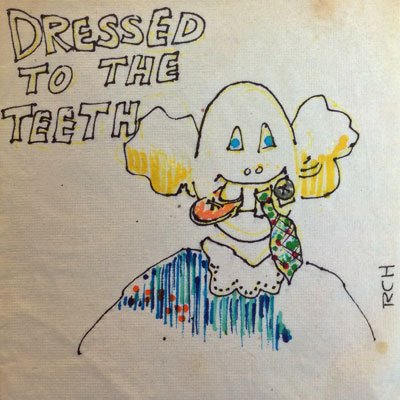
Sea Gull Cellar Bar Napkin Art, Roy Hoggard artist
The complete irresponsibility of man for his actions and his nature is the bitterest drop which he who understands must swallow.
Nietzsche, Human, All Too Human
No doubt many brilliant and talented people are sometimes absent-minded. Concentrating the mind to solve a difficult problem is not unusual. Thus—the myth of the mad scientist or the absent-minded professor. But, even the rest of us are absent-minded at times. Imagine if we were not. What if we were like Funes in the Borges story Funes, His Memory who sees and remembers every detail? We would never get anything done.
With one quick look, you and I perceive three wineglasses on a table; Funes perceived every grape that had been pressed into the wine and all the stalks and tendrils of its vineyard. He knew the forms of the clouds in the southern sky on the morning of April 30, 1882, and he could compare them in his memory with the veins in the marbled binding of a book he had seen only once, or with the feathers of spray lifted by an oar on the Rio Negro on the eve of the Battle of Quebracho. Nor were those memories simple—every visual image was linked to muscular sensations, thermal sensations, and so on. He was able to reconstruct every dream, every daydream he had ever had. Two or three times he had reconstructed an entire day; he had never once erred or faltered, but each reconstruction had itself taken an entire day. “I, myself, alone, have more memories than all mankind since the world began,” he said to me. And also: “My dreams are like other people’s waking hours.” And again, toward dawn: “My memory, sir, is like a garbage heap.” A circle drawn on a blackboard, a right triangle, a rhombus—all these are forms we can fully intuit; Ireneo could do the same with the stormy mane of a young colt, a small herd of cattle on a mountainside, a flickering fire and its uncountable ashes, and the many faces of a dead man at a wake. I have no idea how many stars he saw in the sky. Funes, His Memory by Jorge Luis Borges
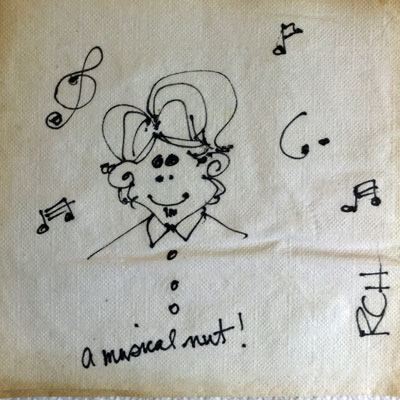
Sea Gull Cellar Bar Napkin Art, Roy Hoggard artist
Funes had what scientists call highly superior autobiographical memory (HSAM). Yes, the condition exists in real life though not to the extent described by Borges in his story. People with HSAM describe the ability to remember as “non-stop, uncontrollable, and totally exhausting.” Doctors who have studied HSAM believe there are only a hundred or so people in the world with this condition. Many suffer from depression and anxiety because they lack the ability to “let certain things go.” People with HSAM do not have perfect memories. They are not much better than anyone with names or phone numbers or faces or mundane details. Some tend toward obsessive behavior such as extreme orderliness and germ-avoidance. There is an emotional burden of not being able to forget as evidenced in the Borges story. But, there is also an emotional burden in not being able to remember.
I have been accused of “absent-mindedness,” and no doubt this is true. But I think that a significant part of what is variously called my “shyness,” my “reclusiveness,” my “social ineptitude,” my “eccentricity,” even my “Asperger’s syndrome,” is a consequence and a misinterpretation of my difficulty recognizing faces. Oliver Sacks
There are many examples of absent-mindedness in literature. One of the best, Virginia Woolf in To the Lighthouse, is discussed by James Wood in an interesting article Virginia Woolf’s Forgetful Selves.

Sea Gull Cellar Bar Napkin Art, artist unknown
The delicate question then becomes, what is the status of irrelevant thought? Is it remembered data or forgotten data? Is it the very definition of the self, or everything but the self? Are absent-mindedness and present-mindedness the same thing? Do Clarissa Dalloway and Mrs. Ramsay remember themselves? Do they know who they are? St. Augustine points out in the Confessions that memory is partly convincing yourself of what you already, really knew all along. We are always forgetting things until the moment when we actually remember them. And at that moment, are we really remembering them, or paying a kind of tribute to their forgettability? What does Mrs. Ramsay think she is worth? Worth remembering or only worth forgetting? Surely Mrs. Ramsay is real to us in part because she seems real to herself. She is real to herself but she does not know herself. In this way, Woolf turns female absent- mindedness into the most searching philosophy of the self, and we suffer with her heroines, who are suspended between forgetfulness and remembrance, between their fulfillment and their irrelevance. James Wood
Absent-mindedness in geniuses is considered a sign of their brilliance. The rest of us call our absent-mindedness “senior moments” and think of them a sign of our ineptitude. On the other hand, it might not be “us” but “the world” that is absent-minded as the character Pnin in the book by Vladimir Nabokov argues.
It was the world that was absent-minded and it was Pnin whose business it was to set it straight. Vladimir Nabokov, Pnin

Sea Gull Cellar Bar Napkin Art, Roy Hoggard artist
Mental lapses are not uncommon. Psychologists say that we can experience as many as 30 a week. Having lost my grocery list while shopping last week, I feel better knowing that I’m not alone. It’s also not uncommon to “swap letters, words or parts of words” when speaking—the spoonerism (meaning to say “lighting a fire” you say “fighting a liar). I have friends as I’m sure you do who are famous for their spoonerisms.
Some absent-mindedness is no more than a pleasant and relaxing way to spend a few minutes in an otherwise stressful day. Kafka wrote a very short story (just four sentences in the translation below) that expresses such a feeling (although a argument can be made that the story is about much more than that).
What are we to do with these spring days that are now fast coming on? Early this morning the sky was gray, but if you go to the window now you are surprised and lean your cheek against the latch of the casement. The sun is already setting, but down below you see it lighting up the face of the little girl who strolls along looking about her, and at the same time you see her eclipsed by the shadow of the man behind overtaking her. And then the man has passed by and the little girl’s face is quite bright. Absent-Minded Window-Gazing by Franz Kafka translated by Willa and Edwin Muir

Sea Gull Cellar Bar Napkin Art, Sandra Lindstrom artist
In the Myth of Sisyphus Albert Camus writes of a certain type of absent-mindedness that confirms for him the absurd nature of the world. It is telling that the main character, Meursault, in The Stranger is himself absent-minded but in a special way that makes use of the imagination.
In certain situations, replying “nothing” when asked what one is thinking about may be pretense in a man. Those who are loved are well aware of this. But if that reply is sincere, if it symbolizes that odd state of soul in which the void becomes eloquent, in which the chain of daily gestures is broken, in which the heart vainly seeks the link that will connect it again, then it is as it were the first sign of absurdity. Camus, The Myth of Sisyphus
Saul Bellow’s Herzog provides an example of the timeworn absent-minded professor.
At that time he had been giving adult-education lectures in a New York night school. He was clear enough in April but by the end of May he began to ramble. It became apparent to his students that they would never learn much about The Roots of Romanticism but that they would see and hear odd things. One after another, the academic formalities dropped away. Professor Herzog had the unconscious frankness of a man deeply preoccupied. And toward the end of the term there were long pauses in his lectures. He would stop, muttering “Excuse me,” reaching inside his coat for his pen. The table creaking, he wrote on scraps of paper with a great pressure of eagerness in his hand; he was absorbed, his eyes darkly circled. His white face showed everything – everything. He was reasoning, arguing, he was suffering, he had thought of a brilliant alternative – he was wide-open, he was narrow; his eyes, his mouth made everything silently clear – longing, bigotry, bitter anger. One could see it all. The class waited three minutes, five minutes, utterly silent. Saul Bellow, Herzog

Sea Gull Cellar Bar Napkin Art, artist unknown
In her humorous sketch Absentminded, Lydia Davis shows us how odd we feel when we are confronted with our own absentmindedness. You may well recognize this scene as something from your own past.
The cat is crying at the window. It wants to come in. You think about how living with a cat and the demands of a cat make you think about simple things, like a cat’s need to come indoors, and how good that is. You think about this and you are boo busy thinking about this to let the cat in, so you forget to let the cat in, and it is still at the window crying. You see that you haven’t let the cat in, and you think about how odd it is that while you were thinking about the cat’s needs and how good it is to live with the simple needs of a cat, you were not letting the cat in but letting it go on crying at the window. Then while you’re thinking about this and how odd it is, you let the cat in without knowing you’re letting the cat in. Now the cat jumps on the counter and cries for food. You see that the cat is crying for food but you don’t think of feeding it because you are thinking how odd it is that you have let the cat in without knowing it. Then you see that it’s crying for food while you’re not feeding it, and as you see this and think it’s odd that you have not heard it cry, you feed the cat without knowing that you’re feeding it.
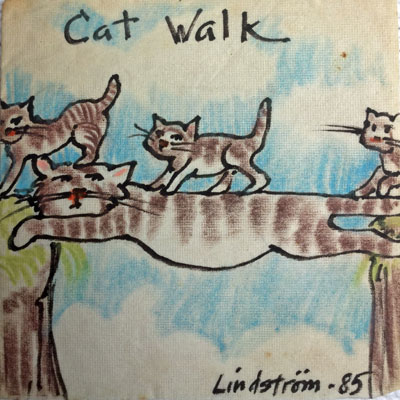
Sea Gull Cellar Bar Napkin Art, Sandra Lindstrom artist
Absent-mindedness is so common there are math problems based on it.
An absentminded professor wrote n letters and sealed them in envelopes without writing the addresses on them. Then he wrote n addresses on the envelopes at random. What is the probability that exactly k of the envelopes were addressed correctly? For the answer, go HERE.
Being absent-minded is not an example of social deviance nor is it a license to be a dickhead. Memory lapses are common for everyone and not a sign of the onset of dementia. Memory is not predictable. It depends on “how tired you are, if you’re hung over or if you’ve got something going on in your life, like a new baby … we all make these odd mistakes.”
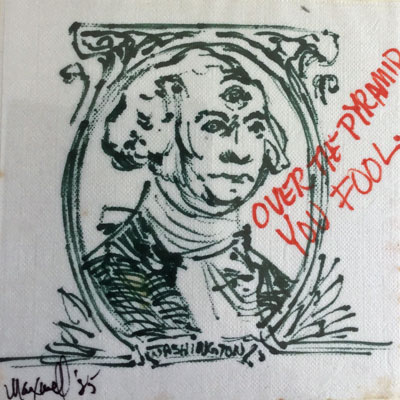
Sea Gull Cellar Bar Napkin Art, James Maxwell artist
Who says that to be absent-minded is to lack in focus? The absence of mind just means the mind is meandering through fascinating labyrinths that are invisible to the open eye. Or else, that it is focused on something else that is not of this world, an elusive element that we seek to chase, understand, grasp and perhaps bring back into this world as poetry, writing, a sketch, a unique thought, or a great discovery! It points to a mindlessness that allows us to soak up experiences and knowledge that too much mindfulness of the present reality cannot give us. Vinita Dawra Nangia, Are You Often Absent-Minded
If for Thomas Gray “ignorance is bliss”, to be absent-minded is even better. Like the old joke about the difference between ignorance and apathy (I don’t know and I don’t care), absent-mindedness embodies ignorance within a broader framework. The absent-minded person in all of us reaches out to find things we didn’t even know exist. And that could be good.
Practical men who believe themselves to be quite exempt from any intellectual influence, are usually the slaves of some defunct economist. Madmen in authority, who hear voices in the air, are distilling their frenzy from some academic scribbler of a few years back. John Maynard Keynes

Sea Gull Cellar Bar Napkin Art, Roy Hoggard and Jack Haye artists

